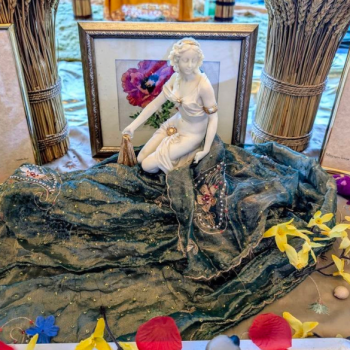Editors' Note: This article is part of the Patheos Public Square on Consumerism Gone Wild. Read other perspectives here.
I like my stuff as much as the next person. I know the world is filling up with trash and that stuff can't really make me happy, but I love my iPhone and my made-in-China garden cart that makes yard work so much easier. I buy the "green" option when it's available and I can afford it, but when that's not the case I confess I rarely do without simply because buying something will contribute to injustice, climate change, overconsumption, environmental degradation, or waste.
I'm a nice person. My participation in America's consumer culture is not something I typically view as "greed." And yet when you stand back and look at the results of millions of people living the way I do, it becomes pretty obvious that's what it is.
Greed is really just grasping after happiness in all the wrong places. This is illustrated beautifully in the Buddhist teaching of the "six realms" of existence, which includes a heaven and a hell but also four other realms. The thought is that we don't stay in any realm of existence permanently, but rather cycle through them throughout our lives, or over the course of multiple lifetimes. In modern times, Western Buddhists usually interpret these realms metaphorically, but even then they describe certain aspects of reality pretty accurately.
One of the Buddhist six realms is that of the "hungry ghosts." In this realm, beings are unable to eat or drink. They have mouths too tiny for any food to enter, and such long, skinny necks that water evaporates before it reaches their stomachs. They suffer the torment of unappeased hunger and thirst, and search endlessly in the vain hope that they will find some food and water they'll be able to imbibe. The only thing that can free the hungry ghosts from their fate is if they face the truth that they were stingy or greedy in the past, and then atone for their actions, but this course is too difficult for the ghosts to accept, so they keep wandering.
Metaphorically, we are hungry ghosts when we keep searching for satisfaction in things that will never ultimately satisfy, or will do so only temporarily. We look forward to obtaining the next thing, going on the next trip, eating the next delicious meal, making the next home improvement, enjoying the next entertainment… and while these things often bring us great pleasure, at a certain level we are starving.
We are starving for time and real relaxation, but we sacrifice all the space in our lives trying to obtain, achieve, and experience more. We are starving for meaningful, sustained, committed human relationships, but we work so hard to afford what we want that we don't have enough time for people. We are starving for a sense of connection to the deeper meaning of our lives, but we are so convinced the meaning is right around the next corner, attached to something we have to pay for, we rarely notice or appreciate our lives just as they are. We are starving for peace, and for connection with the earth and all beings, but our striving for satisfaction from ownership and consumption destroys the very life we need to connect to.
We are caught up in a culture of greed and consumption, and most of us have never known anything else.
What can we do? Another Buddhist idea is that the same truths apply at many different scales. When an individual wants to work on her greed, she pauses and reflects. She tries to drop her views and biases, and see what's really going on — how acting on greed only causes more greed, and never brings real happiness or satisfaction; how the most deeply satisfying things in life are always available and don't require money. Wisdom arises when she sees more clearly, and new ways to operate open up before her. She can step out of habitual patterns once she becomes aware of them. She can make wiser and more compassionate choices.
So, if a society wants to overcome greed, it needs to do the same thing: reflect, question, open to change, and try something new. Unfortunately, our society is not very prepared for this learning process.
I'm all for the separation of church and state, but there's one serious repercussion of this separation that may be our undoing: We have also separated all humane values from the "state" (our government and other secular civic organizations and activities). Things like generosity, kindness, honesty, morality, reflection, and self-restraint are considered the province of religion — a private arena of personal choice, regardless of your religious leanings. A given religion or person may or may not manifest these positive values, but that's their business.




